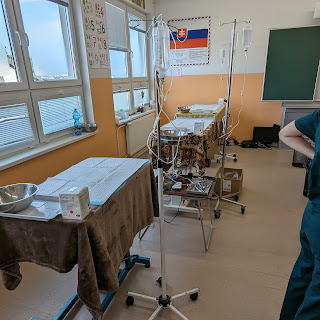State 4 of 6: Diseases of Small Animals
The last 7 weeks have been ... insane.
I started my last year with diseases of pigs, which was a very relaxed way to begin - one might say too relaxing.
Going from a very slow study schedule, only having 50 questions to learn, to having 166 was a bit intense. The schedule for the smalls rotation was much busier too - we had 11 days in the clinic, including a night shift (which thankfully for me was very chill), and you could sort of study but it was the first time we'd seen each other for a few weeks so we did spend a lot of time chatting. I've had the privilege of seeing quite a lot of surgery at my previous job and at my clinical placements, so when the opportunity arose to assist in surgeries, I let my colleagues with less experience take part. The surgery suite at the small animal clinic is actually fantastic, they refurbished fairly recently, and it's incredibly high tech. The only bit I disliked about the clinic was how the animals are treated - not badly necessarily but it seems to be a Slovak thing to jump straight to maximum restraint (and scruffing cats), which is not always necessary (I've observed this at the vets that I take my cats too as well, and despite me asking them not to, they still do).
After we finished at the clinic, we had two weeks of lectures and practicals where we got to practice some procedures on cadavers, and then we were left to our own devices for the remaining 2 weeks-ish.
The study started slow - if you're a long time reader you'll know that I use anki mostly for my studying, but I struggled to properly utilise it for this exam. This exam is basically the culmination of all the studying we've done since day 1, and if I could give one bit of advice for starting to use anki, it's get used to tagging all of your cards so you can find and organise them easily. I did not do this, so I know I have all the information, but I could not find it in my collection of 38,000 cards. Fortunately my classmates also use anki and shared theirs with me. I actually still really want to go through my full collection and tag everything, but that's a very long term project. I'm staying in Slovakia over Christmas with my cats so maybe I can get started on it then.
Anyway, back to smalls - the exam is split in to 4 sections; internal, infectious, reproduction, and surgery. In the exam, you pick a question from each section, and try your best to fend off the attacks from the panel. I did not find them too bad, but as I was the second to last person to answer my questions, you could tell they were tired and wanted to go home so I didn't get grilled too much about my answers. The whole morning had been a pit of stress so I forgot quite a lot but I got through it and walked out of the room with a C (>71%). Frankly I wish I had done better but it's sort of luck of the draw which questions you get, and there's only so much learning you can do in such a short space of time.
We got a lovely speech at the end from the head of the panel basically saying "never stop learning because what you've told us today is not enough to be a vet in the real world" which was a bit unnerving but I get the sentiment.
I'm over the moon to have passed, it's definitely the scariest exam I've done so far, with an approximate 25% fail rate. I've only just mustered up the courage to write about it, after having spent the last two weeks catching up on sleep.

.jpg)

Comments
Post a Comment